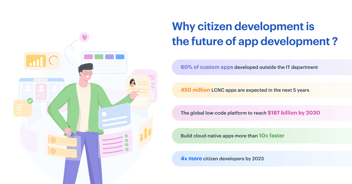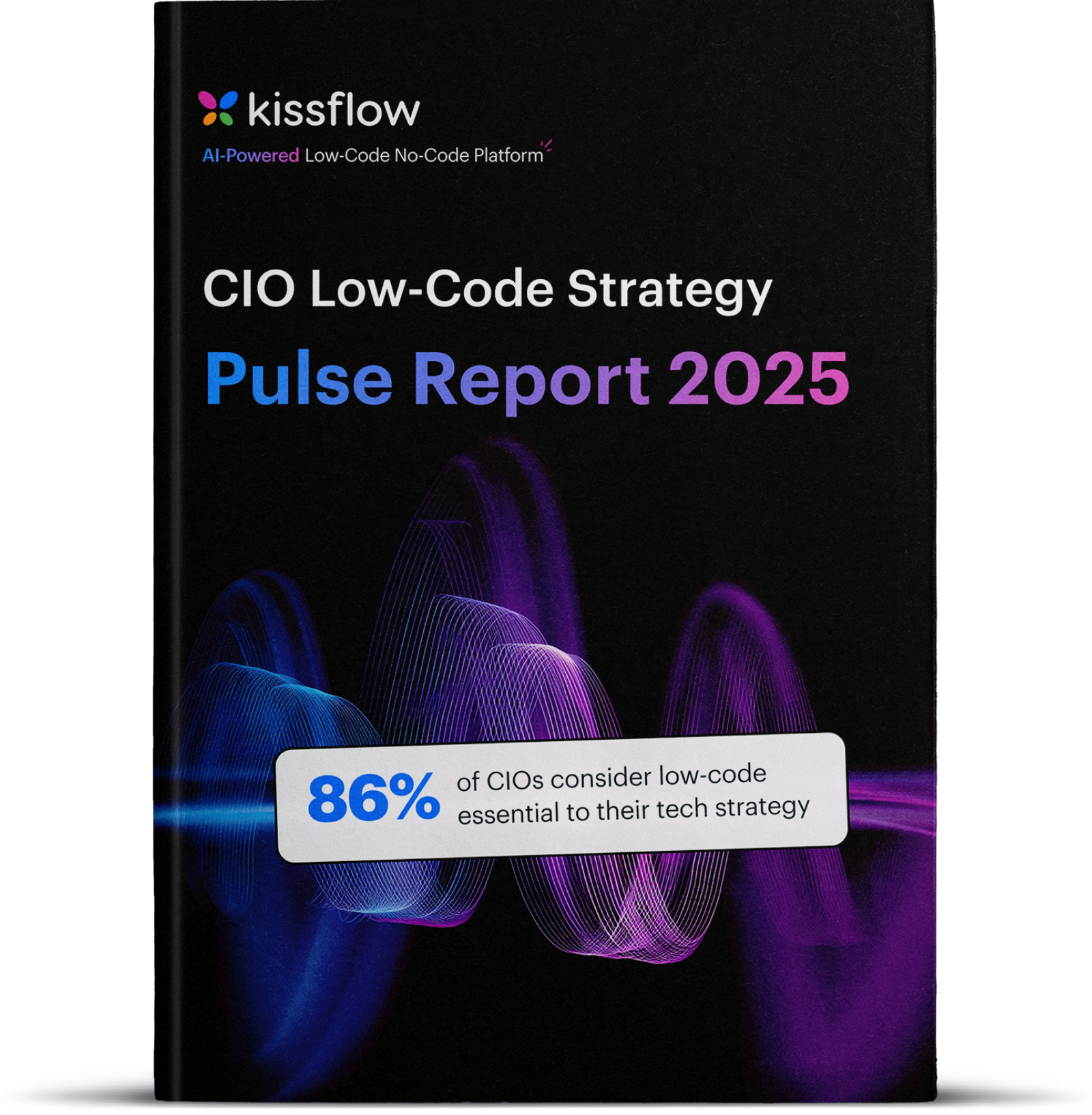-1.webp?width=500&height=300&name=CD%20Apps%20banner%20(1)-1.webp)
- >
- Citizen Development >
- Citizen Development Apps: Why Should Businesses Adopt Them
Citizen Development Apps: Why Should Businesses Adopt Them
Citizen developers and citizen development apps. If you’re wondering what these are, you’re not alone. Simply put, citizen development allows non-technical folks—even those who might still need help setting up their Wi-Fi—to build applications using no-code or low-code platforms.
Citizen development apps are applications created by non-professional developers using low-code or no-code platforms that simplify the development process. These platforms enable individuals without extensive programming skills to build, customize, and deploy software applications that address business needs and enhance productivity.
But why should businesses care about this? Let’s dive in!
Why businesses should adopt citizen developer apps in their organization
It’s about maximizing human resources, speeding up innovation, cutting costs, and staying agile. By adopting citizen development apps, businesses can empower their teams, bridge gaps in communication and efficiency, and future-proof their operations.

Here are key reasons why businesses should consider integrating citizen developer apps into their strategic plans:
- Increased agility: Citizen developer apps enable businesses to respond more quickly to market changes and internal demands. Organizations can develop and deploy apps faster than traditional development channels by empowering non-technical staff to create solutions.
- Cost reduction: By allowing non-professionals to develop applications, companies can reduce the strain on IT departments and lower the costs of hiring specialized software developers. This decentralization of app development also reduces the lead time for project completion, saving additional time and resources.
- Improved innovation: Citizen development democratizes innovation by allowing employees closest to the daily challenges and opportunities to build solutions directly. This bottom-up innovation can lead to more practical and creative solutions finely tuned to the business's needs.
- Enhanced productivity: Apps developed by citizen developers often address specific workflow inefficiencies or automation of routine tasks. By creating custom solutions that meet their needs, teams can work more efficiently and effectively, enhancing overall productivity.
- Better IT alignment: With citizen development, the IT department can focus on more complex and strategic tech initiatives while still overseeing and supporting the development efforts of non-IT personnel. This creates a collaborative environment where IT guides governance, security, and compliance, ensuring that all apps meet organizational standards.
- Scalability: Citizen developer platforms usually offer scalability, allowing applications to grow as business needs evolve. This scalability ensures that functionalities can be expanded without requiring extensive redevelopment.
- Employee empowerment and satisfaction: Empowering employees to solve problems through technology can increase job satisfaction and engagement. This empowerment can boost morale and reduce turnover, as employees feel more valued and see a direct impact from their contributions.
- Risk mitigation: With proper governance frameworks in place, citizen development can reduce risks associated with shadow IT, where employees use unapproved software that could pose security risks. Organizations can maintain greater control over their IT environment by providing a sanctioned route for solving their software needs.

The No-Code Approach to Unlock Citizen Development Excellence
Thank you for downloading!
Why citizen developer apps are the future?
Enter the low-code no-code (lcnc) and citizen developer paradigm:
- Democratization of technology: LCNC platforms have democratized the creation of applications, making them accessible to non-technical users. This shift means more individuals can participate in app development, leading to a broader range of solutions and innovations within a company.
- Faster development and deployment: These platforms reduce the complexity involved in coding, significantly speeding up the development and deployment process. This agility allows businesses to adapt quickly to market changes and internal needs.
Giving a sense of ownership in it:
- Empowering non-IT staff: By enabling non-IT staff to develop solutions, citizen development gives employees across all departments a stake in their technology solutions. This empowerment can increase satisfaction and productivity as employees are directly involved in creating tools that address their specific challenges.
- Enhanced collaboration: This approach fosters a collaborative culture where IT and non-IT personnel work together, blending domain expertise with technical oversight. This collaboration can lead to more effective and user-friendly applications.
Apps made by citizen developers are not infallible:
- Acknowledging limitations: While empowering, it's essential to recognize that apps created by citizen developers are not perfect. They may lack the robustness of those developed by seasoned professionals, particularly in areas like security, scalability, and integration.
- Need for oversight and continuous improvement: This necessitates a structured oversight mechanism where IT departments play a crucial role in governance, ensuring that applications meet compliance, security, and performance standards. Continuous education and feedback loops between IT and citizen developers are essential to refine and improve the applications.
Key features to look for in citizen developer apps
When selecting citizen developer platforms, it’s crucial to consider several key features that ensure the apps meet both the needs of non-professional developers and the strategic requirements of the organization. Here are essential features to look for in citizen developer apps:
- Ease of use and intuitive interface:
- Visual Development Tools: Platforms should offer a drag-and-drop interface that makes it easy for users with no coding experience to build applications.
- Guided Processes: Tutorials, tooltips, and guided workflows help citizen developers understand app creation processes without extensive training. - Security and governance controls:
- User Access Controls: Ability to define roles and permissions for different users to ensure that only authorized personnel can make changes or access sensitive data.
- Audit Trails: Features that log all application changes and updates, providing traceability and accountability for all modifications. - Collaboration features:
- Center of Excellence (CoE) Tools: Resources for best practices, templates, and shared knowledge that support the governance and efficiency of citizen development projects.
- Cross-functional Workflows: Features that enable multiple departments to collaborate on app development and management seamlessly, promoting interdepartmental synergy and efficiency. - Integrations:
- API Connectivity: Robust API integrations that allow apps to connect seamlessly with existing databases, software, and external services, enhancing functionality and user experience.
- Pre-built Connectors: Availability for popular enterprise systems drastically reduces the time and complexity of integrating new apps with legacy systems. - Scalability and performance:
- Scalable Infrastructure: The platform should handle increasing users and data without degrading performance, supporting the organization’s growth.
- Resource Allocation: Features that allow for adjusting computing resources based on demand, ensuring that applications perform optimally even as usage grows.
Use cases for citizen developer apps
Citizen development in construction
RENU Contracting and Restoration, a third-generation business providing diverse services across Long Island and the Tri-State area, faced challenges with manual processes, complex workflow management, and tracking issues using traditional methods like emails and spreadsheets.
Michael Casamento, Director of Process and Procedure, discovered Kissflow, a workflow automation tool that streamlined these processes. By adopting Kissflow, RENU could efficiently manage workflows related to supplier billing errors, merchandise returns, claims processing, and maintenance requests.
Implementing Kissflow enhanced productivity, increased accountability, and significantly reduced the time required to create and track processes. The tool's user-friendly interface and integration capabilities via Zapier further boosted operational efficiency. Kissflow has become crucial for RENU, continually improving its process management and planning to expand its use to on/off-boarding processes.
Citizen development in education
The Alice Smith School, a prestigious international school in Kuala Lumpur, faced challenges with manual, paper-based processes that limited productivity and global accessibility. Bradley Fisher, the Director of IT, integrated Kissflow, a workflow automation tool he was already familiar with from previous experience, to address these inefficiencies.
Starting with the Event Support process, the school gradually adopted Kissflow across various functions, including ERP, Payment and Staff Requisition, and Supplier Registration. Despite initial resistance to shifting from traditional paper methods, Kissflow became integral to the school's technology stack, enhancing functionalities like PDF and Google Drive integration and API capabilities with multiple systems.
The successful integration of Kissflow has significantly shortened service level agreements (SLAs) and propelled the school toward a more efficient, digitally-enabled future.
Citizen development in agriculture
GHB Farms, a family-owned business known for its sustainable farming practices and long-standing client relationships, faced challenges with paper-based and manual approval processes across its six farms. These traditional methods were time-consuming and inefficient, requiring physical presence for approvals and often stalling business operations.
To address these issues, GHB Farms tried Kissflow, a simple workflow automation tool that Emmie Gezernik, an administrator at the farm, found effective even for users with no electronic knowledge. With Kissflow, GHB automates almost all administrative and financial processes, enabling users to get approvals anytime.
This shift saved significant time and effort and eliminated the chaos of paperwork. The successful adoption of Kissflow has made Emmie a power user of the platform, significantly enhancing operational efficiency at GHB Farms.
Conclusion
Citizen development is not just a trend but a fundamental shift in how businesses approach problem-solving and innovation. As organizations look to become more agile and responsive, enabling employees to build applications quickly and with minimal coding expertise is becoming essential.
If you’re searching for an easy-to-use, no-code platform to teach your organization to use without extensive effort and massive restructuring, try Kissflow's Citizen Development Platform. With its user-friendly interface, robust security features, and powerful integration capabilities, Kissflow enables users across industries to transform their ideas into fully functional apps swiftly and securely. Whether you're looking to streamline operations, enhance collaboration, or automate complex processes, Kissflow provides the tools necessary to make it happen.
Empower Yourself as a Citizen Developer and Start Creating Apps Today
Related Articles







